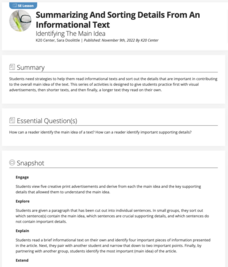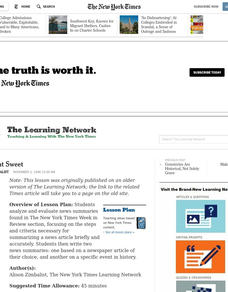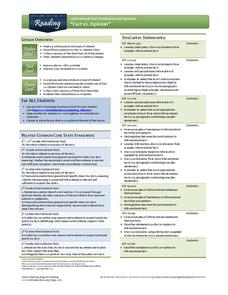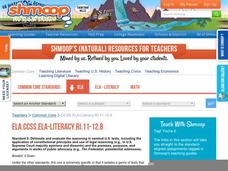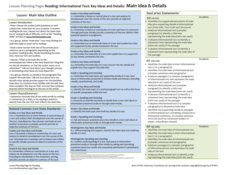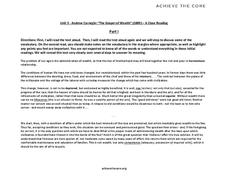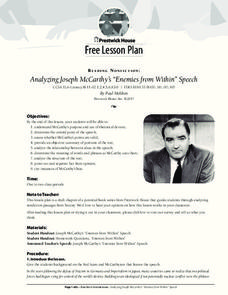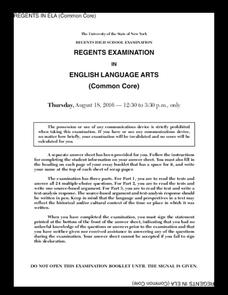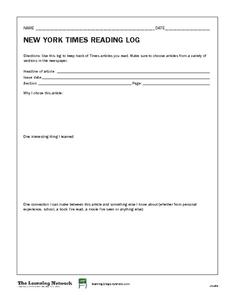Fluence Learning
Writing About Informational Text: The Dred Scott Decision
Looking for a performance assessment that asks individuals to demonstrate their competency in writing about informational text? Use Frederick Douglass' essay "On the Dred Scott Decision," and an excerpt from Abraham Lincoln's 1857 speech...
K20 Learn
Annotating a Text: Style and Syntax
New ReviewIf you have a favorite author, you probably recognize their style. Conduct a close read of the text, marking it up as they go. Collaborative sharing time and a summary writing prompt follow the main activity.
Fluence Learning
Writing About Informational Text: Political Parties
To demonstrate their ability to craft an analysis of informational text, class members read excerpts from James Madison's "The Federalist No. 10," from George Washington's Farewell Address, and from Thomas Jefferson's First Inaugural...
K20 LEARN
Summarizing and Sorting Details from an Informational Text: Identifying the Main Idea
Scholars participate in two activities that teach them to identify the main idea and key supporting details in informational text. Partners create a visual that reflects the main idea and key supporting details in an informational text...
Curated OER
Press Review
How can word choice affect a political speech? Middle and high schoolers examine the text of the 1999 State of the Union Address, and then determine how newspaper articles and television reports describe and analyze the event. Use this...
Curated OER
Short But Sweet
After analyzing and evaluating news summaries found in the New York Times "Week in Review" section, middle schoolers study the steps for summarizing a news article briefly and accurately. They write two news summaries: one on a newspaper...
New York State Education Department
English Language Arts Examination: January 2017
After reading literary and informational texts, scholars answer multiple-choice questions and write both a source-based argument and a text-analysis response.
Curated OER
Introducing the Memo
Examine the text structure of a memo with this worksheet. Eighth to twelfth graders decide if the purpose of a memo is to motivate an action or to provide information to the reader. They explore new vocabulary and make predictions prior...
Curated OER
Strong Convictions
How can the rhetorical structure of an editorial help to develop its argument? Use this New York Times editorial to emphasize the importance of structure in a piece of informational text. Adolescent writers then use the editorial as a...
For the Teachers
Fact vs. Opinion
Many informational texts are written as factual, but can your learners determine when an opinion is presented as fact? Have your kids read several articles on the same topic and record the statements that contain either facts or...
New York State Education Department
English Language Arts Examination: August 2017
Reading and comprehending a poem is a lot different than doing the same for a piece of fiction or an informational text. As part of a sample English language arts examination, readers put their skills to the test by reading passages in...
New York State Education Department
English Language Arts Examination: June 2017
Plants prefer classical music to rock and roll. That's one of the claims in an informational passage that makes up part of a set of standardized assessment questions. The set is part of a larger collection of English language arts tests...
Polk Bros Foundation
Comprehensive Nonfiction Reading Questions
Analyze any nonfiction text with the set of questions on this sheet. Class members practice inferring by noting the main idea and purpose of a passage. They also analyze an opinion in the passage and write a brief summary. See the...
ReadWriteThink
"Three Stones Back": Using Informational Text to Enhance Understanding of Ball Don't Lie
"Three Stones Back," a passage from Matt de la Pena's best-seller, Ball Don't Lie, allows readers to practice their close reading skills as they compare the passage to an information text about wealth inequality.
Shmoop
ELA.CCSS.ELA-Literacy.RI.11-12.8
It is no easy feat to wade through legal and political documents. And incorporating this type of informational text into a literature class can also be a challenge. Here’s a resource that includes suggestions for how to address this...
Curated OER
Instill Inherent Reading Strategies
Marking the text can help transform novice readers into experts and enrich the reading experience
Curated OER
Who Could Have Been Who
Can word choice affect a candidate's likeability? Use a New York Times instructional activity to explore how a presidential candidate's likeability factor can fluctuate in public opinion polls. Young readers choose a presidential...
For the Teachers
Main Idea Outline
Find the main idea in an informational text with a versatile lesson. Three levels of differentiation help you implement the strategy in any age or class level, based on the ability and objectives of your learners.
What So Proudly We Hail
Life, Liberty, and the Pursuit of Happiness: A Lesson on the Declaration of Independence
What does it mean to say that a right is unalienable? How did the founding fathers convey this revolutionary concept in the Declaration of Independence? Engage in a close reading and analysis of the Declaration of Independence, and...
Curated OER
The Gospel of Wealth by Andrew Carnegie: A Close Reading
Andrew Carnegie's "The Gospel of Wealth" provides high schoolers an opportunity to engage more complex text. After a close reading of the essay and an analysis of Carnegie's argument that the rich are superior because they earn money,...
Prestwick House
Reading Nonfiction: Analyzing Joseph McCarthy's "Enemies from Within" Speech
Looking for a activity that teaches class members how to analyze nonfiction? Use Joseph McCarthy's famous "Enemies from Within" speech as a instructional text. Worksheet questions direct readers' attention to the many historical...
New York State Education Department
English Language Arts Examination: August 2016
If it's true that preparation is the key to success, the English Language Arts Examination handout should help pupils ace their exams. Scholars read several texts and answer multiple-choice questions. Then, they write source-based...
Odell Education
Reading Closely for Textual Details: "We, as a people, will get to the promised land!"
Take another look—there are probably more details than readers realize. Scholars analyze nine texts in a five-part unit that contains 21 activities to find textual details. Activities include close reading, independent reading,...
The New York Times
New York Times Reading Log
Inspire your pupils to read the news and make connections between articles and another text, event, or experience with a straightforward reading log. Learners note down the article information at the top of the worksheet and then respond...
Other popular searches
- Nonfiction Text
- Nonfiction Text Features
- Informational Texts
- Comparing Texts
- Reading Informational Texts
- Informative Text
- Expository Texts
- Choral Speaking Texts
- Expository Texts Examples
- Summarizing Nonfiction Text
- Nonfiction Text Structures
- Persuasive Texts





